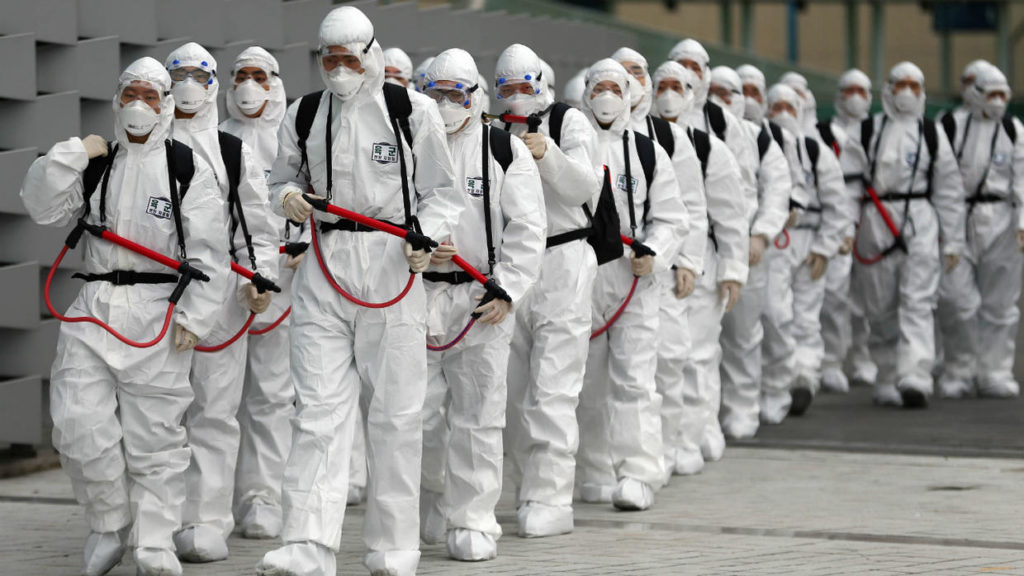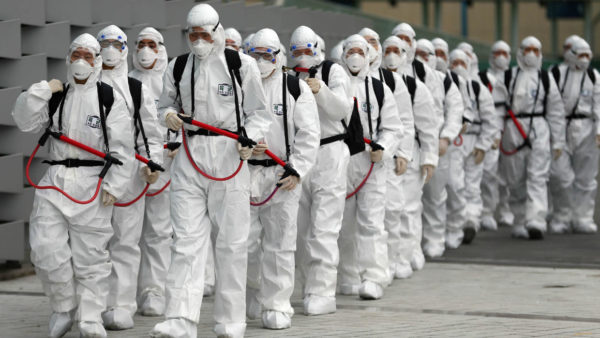South Korea confirmed 813 more coronavirus cases on Saturday, the biggest increase to date for the country, taking the national total to 3,150 infections with four additional deaths.

Authorities also reported the country’s first case of reinfection – a 73-year-old woman who tested positive for a second time after her recovery and release from hospital last week.
The illness recurred “as her immune system had declined”, said Korea Centers for Disease Control and Prevention (KCDC) official Kwon Jun-wook.
At least 10 reinfection cases have already been reported in China, Kwon added.
More than 90 percent of the new cases were in Daegu, the centre of the country’s outbreak, and its neighbouring North Gyeongsang province, the KCDC said in a statement.
Three women in the Daegu area and one man died of the illness, taking the national toll to 17, the statement added. All were aged in their 60s or older.
The surge in confirmed cases has led many events to be cancelled or postponed as the outbreak has hit the world’s 12th-largest economy, including concerts by K-pop superstars BTS and the World Team Table Tennis Championships.
The new school term has been delayed by one week nationwide while schools in Daegu by three weeks, and the US and South Korean militaries have postponed forthcoming joint exercises.
Auto giant Hyundai Motor also suspended operations at one of its Ulsan plants after an employee tested positive for the coronavirus.
No citywide quarantine for now
While China reported 47 more deaths on Saturday, it recorded 427 infections – fewer new cases than South Korea – following unprecedented quarantine efforts locking down tens of millions of people in the worst-hit cities.
South Korean officials say they are not considering a citywide quarantine for Daegu similar to the lockdown imposed on Wuhan.
Vice health minister Kim Gang-lip said that of those who tested positive for the virus, 80 percent could be treated with medication because they had “light symptoms”. He added that the rest would need more advanced treatment in hospitals.
The streets of Daegu have been largely deserted for days, apart from long queues at the few shops with masks for sale.
Authorities have urged the public to exercise caution and anyone with a fever or respiratory symptoms to stay home.
Half of cases linked to Shincheonji Church
But South Korea’s total is expected to rise further with screening of more than 210,000 members of the Shincheonji Church of Jesus, a secretive entity often accused of being a cult that is linked to around half of the country’s cases.
A 61-year-old female member developed a fever on February 10, but attended at least four church services in Daegu – the country’s fourth-largest city with a population of 2.5 million – before being diagnosed.
Facing public criticism, a Shincheonji spokesman said the church members were victims of a “witch hunt”.
“I ask you to discard hatred and criticism against our members,” said the spokesman in a video posted on the Shincheonji website.
Members of the church have also traveled overseas, causing fear of wider infection. On February 23, Israel ordered 200 people into quarantine, including 180 pupils and 19 staff from three separate schools, after they were in the proximity of visiting pilgrims from the Shincheonji Church who were carrying the coronavirus.
The South Korean tourists had toured Israeli sites between February 8-15 and upon their return home, 18 of them were discovered to be infected with the virus.
North Korean leader calls for stronger measures
North Korean leader Kim Jong Un warned top party officials of the “serious consequences” of failing to prevent an outbreak on their side of the border.
The impoverished nation, with a weak and ill-equipped healthcare system, has closed its borders to prevent the spread of the disease into its territory.
During a ruling party meeting, Kim called for the country’s anti-epidemic headquarters to strengthen screening and tests to seal off all “channels and space through which the infectious disease may find its way,” Pyongyang’s official Korean Central News Agency, or KCNA, said Saturday.
Kim emphasised that all fields and units of the country should “unconditionally” obey quarantine instructions laid-out by the anti-epidemic headquarters. He called for the strict enforcement of preventive measures against what he described as a tricky virus that spreads rapidly.
“In case the infectious disease spreading beyond control finds its way into our country, it will entail serious consequences,” KCNA quoted Kim as saying during the politburo meeting of the Workers’ Party.
The North has yet to report its first infection from the new coronavirus, but it has been pushing a tough campaign it has described as a matter of “national existence.” The country has shut down nearly all cross-border traffic, banned tourists, intensified screening at entry points and mobilized tens of thousands of health workers to monitor residents and isolate those with symptoms.
The virus has rapidly spread across the world in the past week, causing stock markets to sink to their lowest levels since the 2008 global financial crisis over fears that the disease could wreak havoc on the world economy.
More than 2,900 people have died and over 85,000 have been infected worldwide since it was first detected in the central Chinese city of Wuhan late last year.
(FRANCE 24 with AFP, AP)


Leave a Reply
You must be logged in to post a comment.